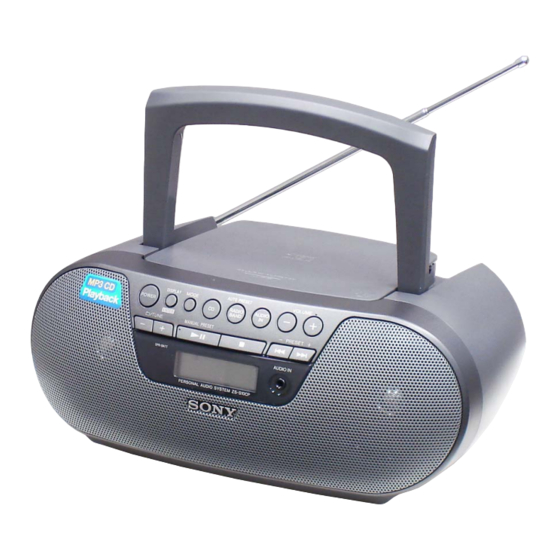Sony ZS-S10CP Manuel d'entretien - Page 3
Parcourez en ligne ou téléchargez le pdf Manuel d'entretien pour {nom_de_la_catégorie} Sony ZS-S10CP. Sony ZS-S10CP 40 pages. Personal audio system
Également pour Sony ZS-S10CP : Manuel d'instruction et d'utilisation (2 pages), Manuel d'utilisation (2 pages), Manuel de démarrage (2 pages)

NOTES ON HANDLING THE OPTICAL PICK-UP
BLOCK OR BASE UNIT
The laser diode in the optical pick-up block may suffer electro-
static break-down because of the potential difference generated by
the charged electrostatic load, etc. on clothing and the human body.
During repair, pay attention to electrostatic break-down and also
use the procedure in the printed matter which is included in the
repair parts.
The fl exible board is easily damaged and should be handled with
care.
NOTES ON LASER DIODE EMISSION CHECK
The laser beam on this model is concentrated so as to be focused
on the disc refl ective surface by the objective lens in the optical
pickup block. Therefore, when checking the laser diode emission,
observe from more than 30 cm away from the objective lens.
UNLEADED SOLDER
Boards requiring use of unleaded solder are printed with the lead-
free mark (LF) indicating the solder contains no lead.
(Caution: Some printed circuit boards may not come printed with
the lead free mark due to their particular size)
: LEAD FREE MARK
Unleaded solder has the following characteristics.
•
Unleaded solder melts at a temperature about 40 °C higher
than ordinary solder.
Ordinary soldering irons can be used but the iron tip has to be
applied to the solder joint for a slightly longer time.
Soldering irons using a temperature regulator should be set to
about 350 °C.
Caution: The printed pattern (copper foil) may peel away if
the heated tip is applied for too long, so be careful!
•
Strong viscosity
Unleaded solder is more viscous (sticky, less prone to fl ow)
than ordinary solder so use caution not to let solder bridges
occur such as on IC pins, etc.
•
Usable with ordinary solder
It is best to use only unleaded solder but unleaded solder may
also be added to ordinary solder.
NOTE OF REPLACING THE IC1 ON THE MAIN BOARD
IC1 on the MAIN board cannot exchange with single. When this
part is damaged, exchange the complete mounted board.
TEST DISCS
Use following TEST DISC when this unit confi rms the operation
and checks it.
Part No.
Description
3-702-101-01
YEDS-18 (for CD)
4-225-203-01
PATD-012 (for CD)
SECTION 1
SERVICING NOTES
CHUCK PLATE JIG ON REPAIRING
On repairing CD section, playing a disc without the CD lid, use
CHUCK PLATE JIG.
Part No.
X-4918-255-1
LASER DIODE AND FOCUS SEARCH OPERATION
CHECK
During normal operation of the equipment, emission of the laser
diode is prohibited unless the upper lid is closed while turning on
the S801 (push switch type).
The following checking method for the laser diode is operable.
• Method
Emission of the laser diode is visually checked.
1. Open the CD lid.
2. In the standby state, press the [POWER] button to turn the
power on.
3. Press the [CD] button to turn the CD function.
4. Push the S801 as shown in Fig.1.
Note: Do not push the detection lever strongly, or it may be bent or
damaged.
5. Check the object lens for confi rming normal emission of the
laser diode. If not emitting, there is a trouble in the automatic
power control circuit or the optical pick-up.
In this operation, the object lens will move up and down 2
times along with inward motion for the focus search.
Description
CHUCK PLATE JIG
S801
Fig. 1. Method to push the S801
ZS-S10CP
3
